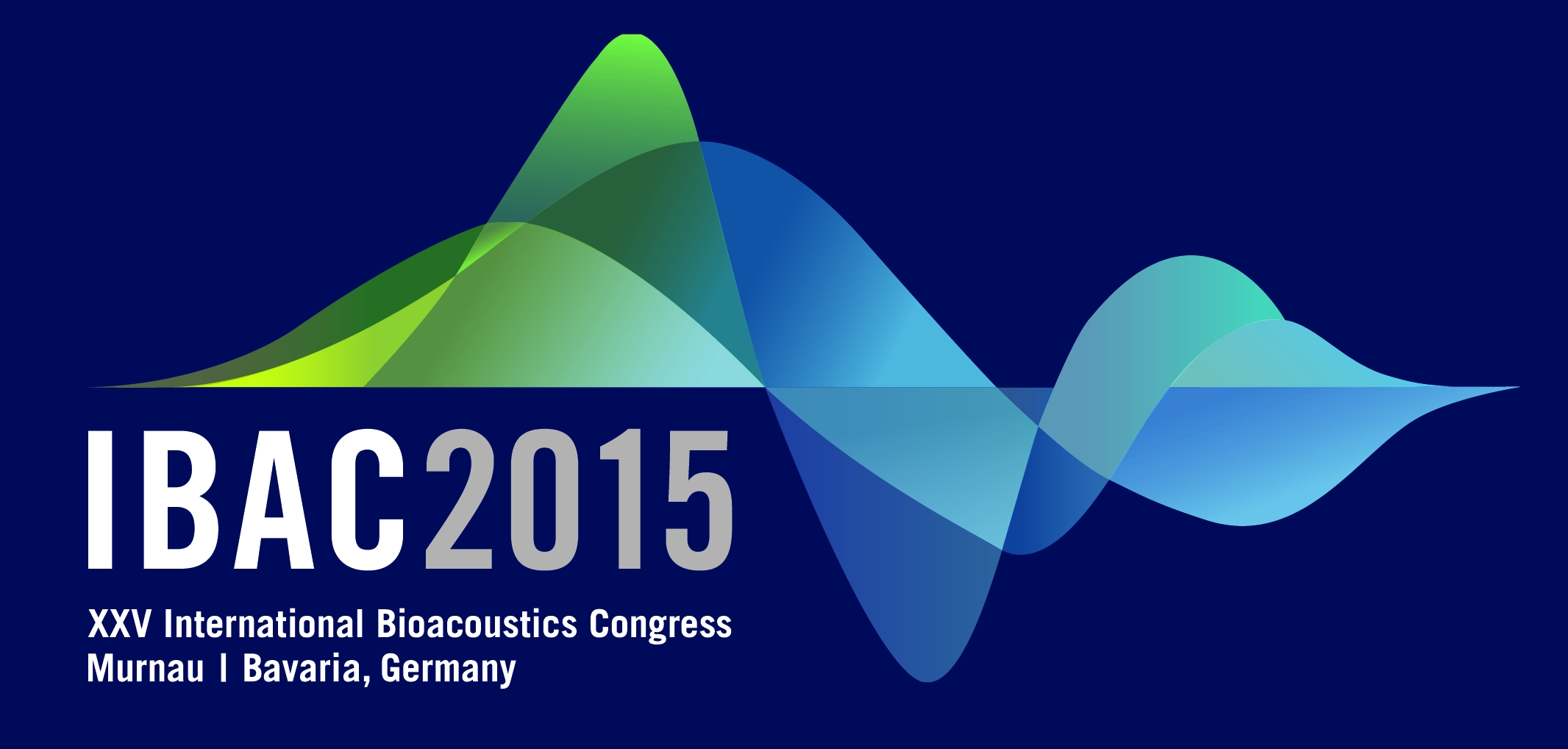Programme
The scientific programme will comprise sessions of invited speakers integrated with thematic symposia, non-thematic sessions, and poster presentations. A downloadable conference booklet, programme and a list of poster communications is available below.
SCHEDULE
The conference will start on Monday, 7 September at 8h00 and end Saturday, 12 September after the optional visit to the MPIO Seewiesen. Registration will start on Sunday, 6 September at 17h00.
Full conference booklet including all abstracts (8 MB file) UPDATED: double page PDF version | single page PDF version
List of poster communications UPDATED: Adobe PDF
Programme - full list UPDATED: Adobe PDF
Programme overview (the table below may also be downloaded as a PDF document):
| Time | Sunday 6th | Monday 7th | Tuesday 8th | Wednesday 9th | Thursday 10th | Friday 11th | Saturday 12th |
|---|---|---|---|---|---|---|---|
| 08:00-08:30 | Registration | ||||||
| 08:30-09:00 | Daniel Robert Sound frequency analysis through cochlea-like mechanism in an insect |
Julia Fischer Referential communication revisited: the case of vervet monkey alarm calls |
Vincent Janik How does vocal learning affect marine mammal communication? |
Peter Slater Studies of the solos, duets and choruses of "Thryothorus" wrens |
|||
| 09:00-09:30 | Visit MPIO | ||||||
| 09:30-10:00 | Manfred Gahr Welcome / Opening |
Coffee break | Coffee break | Coffee break | Coffee break | ||
| 10:00-10:30 | Mike Ryan What you hear ain’t what you get |
Symposium 3 Acoustic Communication of Arthropods Tony Robillard |
Symposium 5 Vocal Communication and Cognition Auguste von Bayern |
Symposium 6 Mechanisms of Vocal Learning Manfred Gahr |
Symposium 8 Vocalizing Females Michelle Hall |
||
| 10:30-11:00 | |||||||
| 11:00-11:30 | Symposium 1 Control of Vocal Production Coen Elemans & Sue Anne Zollinger |
||||||
| 11:30-12:00 | |||||||
| 12:00-12:30 | Lunch | Gen. Ass. Meeting | Lunch | Lunch | |||
| 12:30-13:00 | Lunch | ||||||
| 13:00-13:30 | Lunch | ||||||
| 13:30-14:00 | Symposium 4 Ecoacoustics Jerôme Sueur |
Excursion | Symposium 7 Techniques in Bioacoustics Andries ter Maat |
Symposium 9 Music, Speech and Language Carel ten Cate |
|||
| 14:00-14:30 | |||||||
| 14:30-15:00 | Symposium 2 Communication Over Various Spatial Scales Fanny Rybak & Thierry Aubin |
||||||
| 15:00-15:30 | |||||||
| 15:30-16:00 | Coffee break | Coffee break | Coffee break | ||||
| 16:00-16:30 | Open Oral Session 1 Henrik Brumm |
Open Oral Session 2 Albertine Leitão |
Open Oral Session 3 Michiel Vellema |
||||
| 16:30-17:00 | Coffee break | ||||||
| 17:00-17:30 | Registration | Poster Session 1-80 |
|||||
| 17:30-18:00 | Poster Session 81-161 |
Poster Session 81-161 |
|||||
| 18:00-18:30 | Poster Session 1-80 |
||||||
| 18:30-19:00 | |||||||
| 19:00-19:30 | Bar | Ole N. Larsen Closing Remarks |
|||||
| 19:30-20:00 | Social Dinner Award Ceremony |
Bar | |||||
| 20:00-24:00 |
Latest news: WORKSHOP on analysis of animal acoustic signals in R
held by Marcelo Araya-Salas.
Thursday, September 10th, 2015 / 15.30 – 17.30 (parallel session)
(max. 20 participants – registration at the conference site)
This workshop is intended for students and researchers interested in analyzing the structure of animal acoustic signals. The workshop will focus on functions from the R package warbleR. This package is designed to streamline bioacoustic analysis, providing users with a workflow that facilitates automated spectrographic visualization and acoustic parameter measurements. The functions in warbleR allow users to download recordings from the Xeno-Canto online repository, create maps of recording locations, automatically (or manually) detect signals, print spectrograms of full recordings or individual signals, and perform acoustic measurements. In addition we will review workflow procedures for quantitative (acoustic parameters) and qualitative analyses (visual classification). Basic familiarity with the R environment is recommended. Participants are expected to bring their computers and install R and Rstudio in advance. R codes and sample sound files for running the analyses will be provided. The workshop will focus on bird vocalizations, but the methods and procedures are also applicable to signals from other taxa.
PLENARY SPEAKERS
1. Mike Ryan, Section of Integrative Biology, University of Texas, Austin, USA.
"How cognition biases sexual communication"
2. Daniel Robert, School of Biological Sciences, University of Bristol, UK.
"Sound frequency analysis through cochlea-like mechanism in an insect"
3. Julia Fischer, German Primate Center, University of Göttingen, DE.
"Referential communication revisited: the case of vervet monkey alarm calls"
4. Vincent Janik, Scottish Ocean Institute, St. Andrews, UK.
"How does vocal learning affect marine mammal communication?"
5. Peter Slater, School of Biology, University of St. Andrews, UK.
"Studies of the solos, duets and choruses of "Thryothorus" wrens"
1. Control of vocal production: a comparative view of vocal organs and brains
Chair: Coen Elemans / Sue Anne Zollinger
2. Communication over various spatial scales: Sound propagation, perception and production
Chairs: Fanny Rybak / Thierry Aubin
3. Acoustic communication of Arthropods
Chair: Tony Robillard
4. Ecoacoustics: a change of scale in the study of animal sounds
Chair: Jerôme Sueur
5. Vocal communication and cognition (primates/ cetaceans/ ravens/others)
Chairs: Auguste von Bayern
6. Proximate and ultimate mechanisms of vocal learning
Chair: Manfred Gahr
7. Technical advancements in bioacoustics: From sound analysis to telemetry
Chairs: Andries ter Maat
8. Vocalizing females: Sexual dimorphism revised
Chair: Michelle Hall
9. Music, speech and language: A comparative view
Chairs: Carel ten Cate
